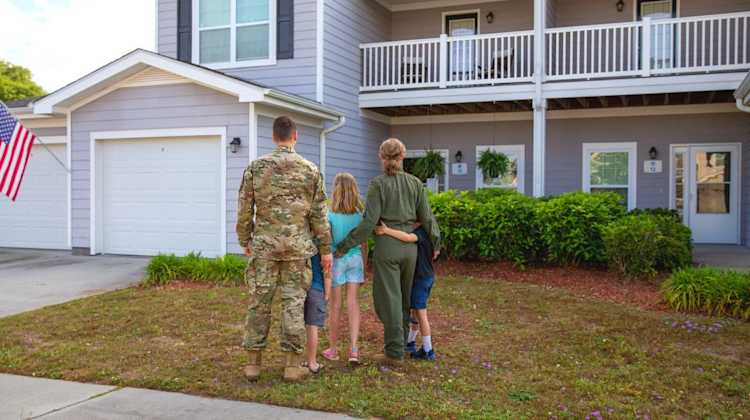PCS Q&A: Handling Your Business at Home & on the Road
by Lizann Lightfoot - November 4th, 2021

Special guests:
Lauren Hope of Hope Design Ltd: Owner and artisan who hand-crafts jewelry to honor veterans and heroes. I work from home with kids.
Stacey Benson: Owner and photographer behind MilStock. I’ve been a military spouse for 18 years (he’s been Army and Coast Guard), and I’ve been a photographer for about 25 years.
Maria McConville: Army veteran and spouse, registered dietitian, certified Health and Wellness Coach, owned a consulting business for 7 years and worked remotely for 9 years. She is also spouse to the US Army Chief of Staff, mom of 3 active duty Captains, has done 22 moves in 33 years.
What business/career challenges have you faced because of PCS moves?
Lauren: I was originally a professional chef, and quickly learned that they don’t build fine dining establishments next to military bases. I went from working at the Ritz-Carlton to managing Panera Bread, and finally decorating cakes at the Commissary. I finally decided it was time to pivot and create my own business that would move with me. I took a small loan from family and started my jewelry business, started on Etsy, and eventually grew into a successful brand that can hire other military spouses!
Stacey: The Coast Guard moves every 2 years. The milspouse unemployment rate is already so high, and moving makes it harder. I started out as a wedding planner/ photography in the Outer Banks, but when we moved to New York, no one was traveling there to get married! I started working in the non-profit sector, but always took my photography with me. I have been able to photograph military families and wounded service members, and I can do that no matter where my home has been.
Maria: We have PCSd 22 times in 33 years of marriage. The hardest part is I felt like I was always starting over at an entry-level position. I wanted to go back to school for my Master’s so I could stop applying for the entry-level positions and progress up the ladder to management. Because applications are all done online now, there is no contact, and you don’t know if anyone is receiving your application or reviewing your resume. When I finally got a job, I found out we were moving within the year. I proposed to stay with them while working from home. I did that for several years until the company merged, so I finally started my own company and position. I am a registered dietitian, and the most difficult thing is transferring licensure. The states now have individual licensure, so I had to get re-licensed in every state, and pay each previous state to say that I was in good standing. When we moved a few miles from Virginia to Washington D.C., the district wanted me to get fingerprinting and background checks. This is cumbersome for many military spouses. I have been working with the Dept of Labor and the 2nd Lady’s office to grant reciprocity legislation. We aren’t done until all 50 states sign it!
Having your own business now, what are some of the challenges you face at a new location?
Lauren: It’s like doing laundry where you have to wash, rinse, repeat. First I have to contact clients and shut down the business and let people know there is a cut-off date. I sometimes end up selling jewelry out of my van while moving! My assistant lets everyone know that we are moving/ on vacation. Then there is all the paperwork. I keep my headquarters based out of my home of record state, and create a satellite position at each current state, so I pay state taxes at both locations. This means updating double the addresses. Then I have to create a new customer base at the new locations. The military is a small community– word of mouth means everything! If you know a small business is moving to a new duty station, let people know, it means the world to them! I don’t pay for advertising, but I pay military spouses to run my social media.
How has your self-employment journey led you to where you are today?
Stacey: I started photography in the Outer Banks. Everywhere we went I had to pivot. I learned graphic design and websites, and I built websites. I realized that 99% of my clients were military, and the only thing I consistently took with me was my photography. When we were in Buffalo, we were far from the military community, so it was hard to get word of mouth in the civilian community, so I made newborn photography props and sent them all over the world. Then we moved to the Navy base and built a base of military clients. Then I started working in the non-profit sector: my work was seen in Times Square during the holidays! Then we moved to Oregon and we were only supposed to be there a year, so I didn’t bother building a business, but it got pushed back another year, so I was working from home in the non-profit job. Now we are in South Carolina, so I do casting calls for MilStock. I have done photos for Military Spouse Magazine and for PCSgrades.
What else can we tell spouses about when setting up a business in a new state?
Maria: We build our retirement house in Florida, and used to own a condo in Florida, so we have had Florida as our home of record during most of his military career. I started my business there and hired an accountant to handle all the taxes and expenses. I pay Florida taxes, and renew my LLC status there every year. Because I am a consulting business for corporate organizations, I don’t need a license in each state. I don’t have to move my business, just myself and my household. Being an independent contractor has had a lot of advantages: I don’t need healthcare or to accrue vacation time. I set my own dates and have my own business.
Lauren: Lawyers have always advised me to contact a lawyer in the state you are moving to. MSJDN (Military Spouse Judiciary Network) can help you out and give you details for the state you are moving to. Start reaching out at least 3 months before you move, so you know the challenges of having a business registered on base/post, and selling products on base/post. Find your squad and your cheerleaders! A local one is worth its weight in gold!
Maria: Know your state and federal regulations. If you live on base, you can’t just fly under the radar. Have the right paperwork and compliance, or you are setting yourself up for business liability issues. Do not let your personal assets be liable! Set up an LLC or a Corporate Partnership, talk to a lawyer or accountant to make sure you are in compliance with regulations and not putting yourself and business at risk. If you are operating a hair business or something using a lot of machinery or energy, the house might not be equipped to handle that. If you start a fire, are you covered for that?
How do you protect your product/service?
Stacey: Make sure you create a logo, turn it into a watermark, and make sure you put that on everything you post online. Anyone else can download your image, and may not give you credit. Never sell your raw images. When you give them to someone else, they will edit them, and the changes may not be within your brand. Your images should reflect your brand and your business, so offer prints instead of digital images if you aren’t comfortable. But don’t sell your raw images.
How do you protect intellectual property?
Stacey: There is a law- the Lantham Act and the Intellectual Property Law– that every time you click the shutter, the image belongs to the photographer who took it. If you want to trademark your images, it costs around $25- $35 per image, and gives you the legal protection to sue for thousands of dollars if someone misuses your image. Make sure you have your paperwork in order, and get your model releases and permission and have your contracts set up to establish how companies can use your images.
What advice would you give to spouses considering starting a business?
Maria: Is it really a business, or is it an expensive hobby? Some people have trouble telling them apart. Decide if you really want a business, and develop a business model. Know what it takes to have a business: envision yourself a few years from now– what does that business look like, and how has it changed from now? Start with the end in mind, then put goals in place to achieve that. The majority of small businesses fail in the first year because you don’t know your strengths and weaknesses. Hire someone to help as an interim, to manage social media, or to do repetitive tasks. Be careful, don’t use anyone, but work with others to fill in for your weaknesses. Know about the regulations and the federal and state laws, liability coverage, etc. There are so many resources out there now: Military One Source, USO pathfinder, IBMF, Rosie Network, Hiring Our Heroes. Use those resources and tap into others in the spouse employment space. Don’t get overwhelmed by all the options.
What has been your greatest joy in having your own business?
Lauren: Having my own self-identity back! It’s nice to be me, and have a job that allows me to raise my kids first, and focus on all the things second. Know that it’s okay to take two steps forward and then one step back. You will pivot and learn to create something else.
Stacey: I love photographing women, telling them where to stand, having them trust me, and showing them from the camera how beautiful they look. I love being able to show women and families how beautiful they are, and their confidence rise and their eyes get a little brighter.
Maria: I think it’s very empowering to have your own business and your own thing, so you aren’t just the service member’s spouse/title/rank. I feel best when I am working and contributing and using my own knowledge, skills, and talents. I’m not in the Army and I like having my own separate thing. My family and kids aren’t ALL of me. We aren’t just one thing. In between jobs I can still volunteer and contribute in other ways, and when I work I give value AND feel valued.
We have seen the DOD focus on spouse unemployment this year. What is the Army doing to help with spouse unemployment right now?
Maria: When you live on base, there is a process to register your home-based business, but it is a cumbersome process and different at each installation. The home-based business falls under the G9 in the Army, so they put out a notice last year that applications must be reviewed and decided on within 30 days. There are few spouses who are in competition with DeCA (Commissary), so they have lifted those restrictions. MWR is now allowed to have spouse-owned businesses at tables at events. We are working with the Rosie Network to see how we can streamline the processes. Before COVID, I was travelling with my husband to bases to check on the spouse-owned businesses, then see how the process is working with the privately-owned companies, so I will learn more when I start travelling again.
For spouses who work outside the home and have state licenses or certifications (therapists, teachers, nurses, etc). What progress has been made for their careers?
Maria: DoD will now reimburse spouses up to $500 to get a license in a new state. Army Emergency Relief can give a grant for up to $500 more. The service member had to be the one to apply, but it is progress being made. Advocate for state governors to give the same reciprocity seen in other states. Nurses and attorneys have a professional compact, but states can pick and choose what they decide to comply with (expedited, waived fees, etc) so it would be best if all the governors would grant transfer of licensure for anyone in good standing in another state. Karen Pence’s office has been working very hard on that, so advocate for those bills if you have any legislative contacts.
There are a lot of job resources. Military Spouse Corporate Career Network is actually a job placement company, so I have been working with them on more telework options. Since COVID, more companies are willing to have teleworking employees. If we can do telehealth, that will open up lots of job opportunities for military spouses.
Childcare has always been one of the biggest obstacles to spouse employment. Working from home won’t work for everyone, some couldn’t with their child situations, but it does provide more options for a lot of people.
Stacey: Lakesha Cole said, “Launch it broken, fix it live!” There are instructions on YouTube for everything! Learn what you can, research what you can’t, so find a way to use your skills to figure out how to make things people need. If I can do it, you can! If you wait until the timing is right, it will never be right. Just do it! You won’t regret the things you try, just the things you don’t try.
Watch the full video of this webinar on our YouTube Channel here.








